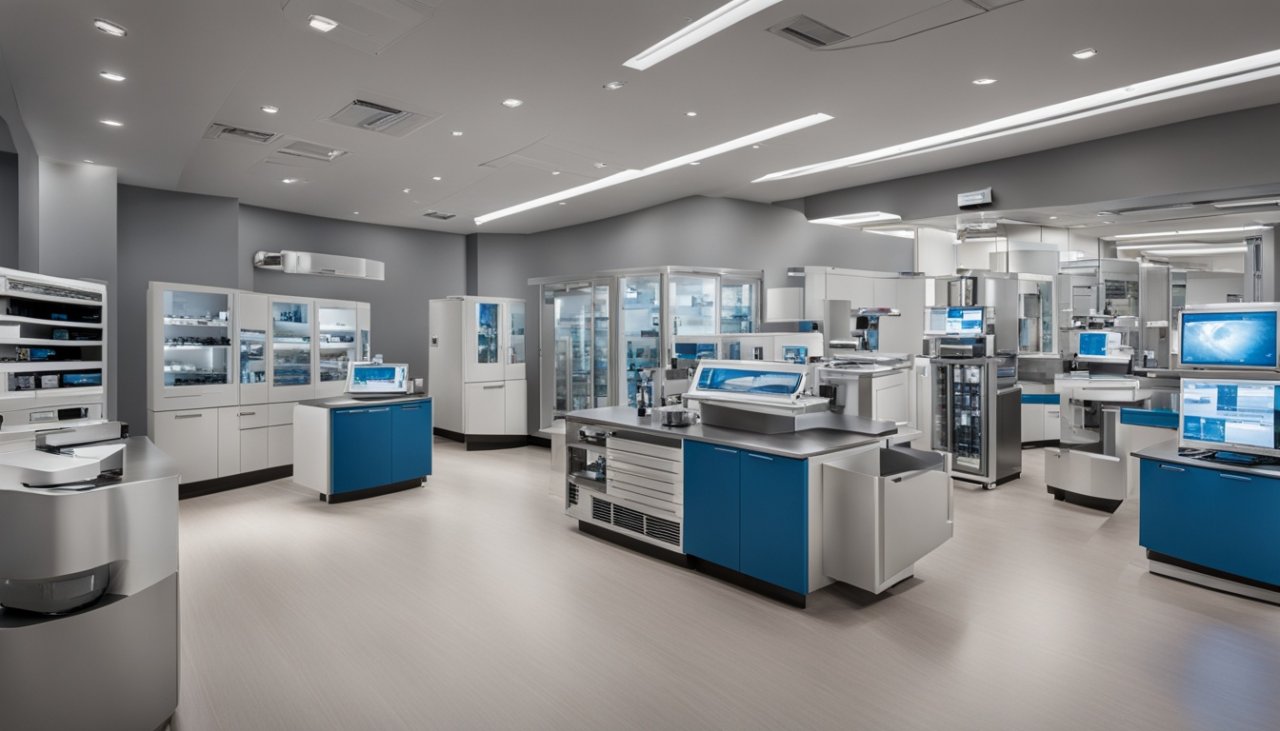When I started my medical supplies distributor business, I knew that selecting the right suppliers would be crucial to its success. After all, the quality and reliability of the products I offer depend on the suppliers I work with. But with so many options out there, how do you choose the right ones?
Let me share a story that illustrates the importance of supplier selection. A friend of mine, Sarah, started an online medical equipment store a few years ago. She was excited to offer a wide range of healthcare equipment to customers across the country. However, Sarah didn’t invest enough time in finding the right suppliers.
Soon, Sarah realized that the products she received from one of her suppliers were of poor quality. Some of the products didn’t meet the necessary regulatory standards, and customers started complaining. It was a setback for Sarah’s business, and she had to spend valuable time and resources resolving the issue.
This unfortunate experience taught Sarah, and it should teach all of us, the importance of selecting the right suppliers for our medical equipment businesses. With careful consideration and due diligence, we can avoid such issues and build a successful and reputable company.

Key Takeaways:
- Choosing the right suppliers is crucial for the success of your medical equipment business.
- Poor supplier selection can lead to low-quality products and customer dissatisfaction.
- Invest time and effort in evaluating suppliers to ensure they meet your business requirements.
- Consider factors such as expertise, certifications, intellectual property, and project management capabilities when selecting suppliers.
- Monitor supplier performance periodically and make adjustments when needed.
Determining Supplier Criteria
When it comes to selecting suppliers for your medical equipment business, determining the right criteria is crucial. The criteria you establish will help you evaluate potential suppliers and ensure that they meet your specific requirements.
Some key criteria to consider when evaluating medical equipment suppliers include:
- Capability and Expertise: Assess the supplier’s experience and knowledge in the medical equipment industry. Look for suppliers with a proven track record and expertise in the specific type of equipment you require.
- Manufacturing Processes and Certifications: It is important to choose suppliers that adhere to industry regulations and standards such as FDA 21 CFR 820.50 and ISO 13485:2016 Section 7.4. These guidelines outline purchasing controls and supplier evaluation requirements in the medical device industry.
- Intellectual Property Protection: Intellectual property protection is crucial, especially if you are working with innovative or patented medical equipment. Ensure that suppliers have measures in place to protect your intellectual property rights.
- Price: Price is a common deciding factor, but it shouldn’t be the sole consideration. Evaluate the supplier’s pricing structure and compare it to market standards to ensure you are getting a fair deal.
- Delivery Terms: Timely and reliable delivery is critical in the medical equipment industry. Assess the supplier’s delivery terms, including lead times and shipping options, to ensure they can meet your delivery requirements.
- Flexibility: Determine whether suppliers can accommodate changes in order quantities, customization requests, or any unforeseen circumstances. A flexible supplier can help you adapt to market demands and any unexpected changes.
- Service: Good customer service is crucial for a smooth supplier relationship. Evaluate the supplier’s responsiveness, willingness to address concerns, and their commitment to meeting your needs.
By establishing and considering these criteria, you can ensure that you select suppliers who not only meet your requirements but also contribute to the success of your medical equipment business.
Addressing Supplier Evaluation Challenges during the COVID-19 Pandemic
The COVID-19 pandemic has presented unique challenges in supplier selection and evaluation. The demand for medical face masks and face shields has surged, leading to potential shortages of critical products. To address these challenges, researchers have developed decision-making approaches, such as the Measuring Attractiveness through a Categorical-Based Evaluation Technique (MACBETH) and the Combinative Distance-Based Assessment Method.
In a case study conducted in Istanbul, Turkey, the MACBETH method identified job creation and occupational health and safety systems as the top criteria for supplier selection. By utilizing these approaches, organizations can effectively select and evaluate suppliers during uncertain times, mitigating disruptions and ensuring a sustainable supply chain.
Next, we will explore the importance of ownership and intellectual property in the supplier selection process.
Understanding Ownership and Intellectual Property
In the healthcare industry, ownership and intellectual property (IP) play a crucial role in the development and protection of innovative medical devices. It is important to have a clear understanding of these concepts, especially when working with suppliers.
Regulatory authorities consider the medical device company as the “manufacturer of record” even if the actual manufacturing is outsourced to suppliers. This means that the medical device company holds the responsibility for meeting regulatory requirements and ensuring the safety and effectiveness of the device.
When collaborating with suppliers, it is essential to clarify ownership rights and IP related to specific manufacturing processes and tools. This ensures that the medical device company has the necessary rights to make product changes and modifications in the future. It also safeguards against any disputes or conflicts over ownership or IP.
The importance of IP rights in the healthcare industry is further highlighted by the market growth of wearable technology, which is projected to reach $70 billion by 2025. Companies like Samsung, Apple, Sony, and Philips hold significant numbers of patents protecting the technology behind their wearable devices. This enables continuous development and improvement in the field of healthcare technology.
Strong IP portfolios are valuable assets for medical device companies, especially those in the early stages. They provide licensing revenue, defensive strategies, and can increase the company’s valuation. Filing for IP protection early is crucial due to patent bars and the race to the patent office. Method of use patents and utility patents are significant in the US for medical devices, offering protection for functionality and design aspects, respectively.
Conducting preliminary patent searches and utilizing database tools like USPTO Public Patent Search, Google Patent, WIPO PatentScope, and Espacenet are essential steps in assessing the originality of an invention and determining its eligibility for patent protection. These resources provide access to international patent offices, aiding in the research and analysis of patents related to medical devices.
Formalizing Supplier Agreements
Once a supplier is selected, it is important to establish a formal agreement or contract that outlines the expectations, quality criteria, deliverables, review period, escalation procedures, and terms for any potential changes. This legal record is not only important for the operation of your business but also from a regulatory perspective, as it demonstrates your control and oversight of the supplier.
The supplier agreement serves as a safeguard, ensuring that both parties are on the same page regarding their responsibilities, obligations, and rights. It establishes a clear framework for the business relationship and helps to mitigate potential risks and disputes that may arise in the future.
When formalizing the supplier agreement, it’s crucial to include specific details about the quality criteria and standards that the supplier must adhere to. This ensures that the products or components they provide meet your specifications and maintain the necessary level of quality. Clearly define the acceptable tolerances and any industry-specific regulations that must be followed.
The agreement should also outline the deliverables expected from the supplier, including the quantity, quality, and timeline of the products or services. This helps to manage expectations and ensures that both parties are aligned regarding delivery schedules and deadlines.
A review period should be specified in the agreement, allowing for regular evaluations of the supplier’s performance. This enables you to assess their adherence to the agreed-upon terms, evaluate their reliability, and address any concerns or issues that may arise. It is important to have a mechanism in place to escalate matters if the supplier fails to meet the agreed-upon quality criteria or deliverables.
Furthermore, the supplier agreement should include provisions for any potential changes that may need to be made during the course of the business relationship. These changes can include adjustments to pricing, quantities, specifications, or even a change of paths if necessary. By including these provisions, both parties understand their rights and responsibilities should changes occur.
Overall, formalizing supplier agreements is a crucial step in establishing a strong and reliable supply chain for your medical equipment business. It provides a legal framework that protects your interests and ensures regulatory compliance. By clearly defining expectations, quality criteria, and deliverables, you can build strong partnerships with your suppliers and maintain the highest standards of quality and reliability in your products.

Continuous Evaluation and Supplier Audits
Continuous evaluation and supplier audits are critical aspects of ensuring the quality and compliance of your medical equipment business. Regulatory agencies in the pharmaceutical and medical device industries require internal and supplier audits to ensure adherence to Good Manufacturing Practices (GMP) and ISO standards.
Supplier audits help in identifying potential issues that may impact the quality, efficacy, or safety of your products, thereby minimizing public health risks. As a responsible pharmaceutical or medical device company, it is essential to maintain standards between audits to ensure ongoing compliance.
FDA-regulated manufacturers are obligated to conduct various types of supplier audits to meet regulatory standards, such as Quality System Audits, Pre-Approval Inspections (PAI), Good Manufacturing Practice (GMP) Audits, Good Laboratory Practice (GLP) Audits, Good Clinical Practice (GCP) Audits, Supply Chain Security Audits, Data Integrity Audits, and Risk-Based Audits.
To determine the frequency of supplier audits, creating a manufacturing process flow chart can be beneficial. This chart helps identify critical suppliers whose products or components significantly impact the quality of your medical devices. For critical suppliers, more frequent audits may be necessary to manage risks effectively.
While the general audit frequency is typically between one to two years, the criticality of the supplier and associated risks may require more frequent audits. It is crucial to evaluate your suppliers’ performance regularly, considering their ability to meet specified quality requirements and the impact of their products on the quality of your medical devices.
To facilitate ongoing supplier evaluation, it is recommended to maintain an Approved Supplier List (ASL). This list should include details such as supplier name, approved supplies, contact information, approval status, qualification criteria, monitoring requirements, and review dates.
Supplier qualification for critical components often involves ISO 13485 certification, on-site audits, references, providing certificates of analysis, and establishing agreements on communication regarding any changes. For non-critical suppliers, criteria may include product availability, recommendations, customer service, and returns policies.
While supplier audits are not explicitly required by ISO 13485 or the FDA, they are highly recommended, particularly for critical suppliers. Maintaining detailed supplier files with qualification forms, certificates, performance evaluations, audit reports, communications, and non-conformance reports is essential for ensuring compliance and traceability.
Example Process Flow Chart:
Considering Alternate Suppliers
When running a medical equipment business, it is essential to keep in mind the possibility of exploring alternate suppliers. Your business model may change, or your current supplier’s capabilities may no longer align with your needs. In such cases, considering alternate suppliers can provide you with various advantages and opportunities for business growth.
The supplier selection process, although potentially laborious and time-consuming, plays a crucial role in finding the right partner for your business. Identifying alternate suppliers allows you to evaluate different options and compare their capabilities, cost structures, and product offerings. This analysis can help you enhance your supplier capabilities, optimize your business model, and ultimately improve the overall performance of your medical equipment business.
One significant advantage of considering alternate suppliers is the potential for cost optimization. By exploring different supply options, you may find suppliers that offer more competitive pricing, allowing you to reduce your expenses and increase your profit margins. Additionally, alternate suppliers may have different distribution channels or partnerships, which can provide you with access to new markets and customer segments.
Furthermore, considering alternate suppliers gives you the opportunity to diversify your supply chain and reduce the risk of disruptions. As recent events have shown, unforeseen circumstances, such as supply chain disruptions or global crises, can impact the availability and cost of medical supplies. Having multiple suppliers can help mitigate these risks and ensure a more resilient supply chain for your business.
When evaluating alternate suppliers, it is essential to assess their capabilities thoroughly. Consider factors such as their product quality, reliability, lead times, and ability to meet regulatory requirements. Additionally, examine their track record in the industry and their reputation among other healthcare organizations.
By carefully evaluating alternate suppliers, you can find partners that align with your business goals, enhance your capabilities, and contribute to your success in the medical equipment industry.
As the healthcare industry continues to face supply chain challenges and price increases, strategically considering alternate suppliers is crucial for the long-term success and profitability of your medical equipment business. By exploring different options, assessing supplier advantages, and adapting to changing market conditions, you can ensure a resilient supply chain and drive your business forward.
Supplier Accreditation and FDA Approval
When it comes to sourcing suppliers for your medical equipment business, it is crucial to prioritize regulatory compliance and quality control. Supplier accreditation and FDA approval play significant roles in ensuring that your suppliers meet the necessary standards and requirements.
FDA 21 CFR 820.50 and ISO 13485:2016 Section 7.4 provide detailed regulations on purchasing controls and supplier evaluation for medical device companies. As a medical device company, it is essential to work with FDA-approved suppliers and audited suppliers who demonstrate adherence to stringent manufacturing processes.
Choosing FDA-approved suppliers offers several advantages. Firstly, it ensures regulatory compliance with international standards such as FDA 21 CFR 820.50 and ISO 13485:2016, which are critical for selling medical devices in the US or the European Union. By partnering with FDA-approved suppliers, you can have confidence in their ability to meet the necessary quality requirements.
An effective supplier quality management system enables enhanced quality control, ensuring that the parts supplied by your suppliers meet your expectations. This ultimately leads to improved overall product quality.
In addition, working with FDA-approved suppliers enhances your supply chain agility. With swift responsiveness to market demands, you can quickly adapt to changes and stay ahead in the competitive medical equipment industry.
Moreover, supplier accreditation and FDA approval contribute to the improved brand value of your medical equipment company. By proactively ensuring regulatory compliance and market responsiveness, you can build a strong reputation and gain the trust of your customers.
When evaluating potential suppliers, it is crucial to consider their accreditation status and FDA approval. Building an Approved Supplier List (ASL) based on set criteria is a proactive way to track and manage qualified suppliers while preventing unauthorized purchases.
The ASL should include essential details like the supplier’s name, address, contact information, qualification criteria, approval status, certification expiry date, verification details, and approved product supply list.
It is also important to choose an easy-to-understand format for the ASL and establish updating processes, approval procedures, distribution, and control. This ensures seamless management and easy access to the necessary information.
By prioritizing supplier accreditation and FDA approval, you can confidently establish a reliable supply chain that prioritizes regulatory compliance and quality control, ultimately contributing to the success of your medical equipment business.

Integrating these keywords: FDA-approved suppliers, audited suppliers, manufacturing processes, medical device company, regulatory compliance.
Number of Suppliers to Consider
When starting a medical equipment business, one important decision you will need to make is the number of suppliers to consider. Determining the right number of suppliers is crucial for the success and sustainability of your business. While there is no one-size-fits-all answer, evaluating multiple suppliers can demonstrate due diligence and help you find the best fit for your specific needs.
Supplier evaluation is an essential step in the process of choosing suppliers. By conducting thorough due diligence, you can assess the quality, reliability, and reputation of different suppliers. This evaluation should be based on predetermined supplier criteria that align with your business goals and priorities.
However, evaluating too many suppliers can be time-consuming and may result in decision fatigue. If one supplier clearly meets all your criteria from the start, it may be sufficient to consider only one supplier. This can help you streamline the procurement process and establish a strong relationship with a trusted supplier.
Of course, the final decision should be based on a careful assessment of your specific business needs and industry dynamics. Consider factors such as product availability, pricing, quality, delivery reliability, and customer service. By striking the right balance between evaluating multiple suppliers and ensuring efficiency, you can optimize your procurement process.
Benefits of Evaluating Multiple Suppliers
Evaluating multiple suppliers offers several benefits. First and foremost, it enables you to compare supplier criteria and make an informed decision. By exploring multiple options, you can assess the different strengths and weaknesses of each supplier, ensuring that you choose the one that best aligns with your business goals.
Moreover, evaluating multiple suppliers can help you negotiate better terms and pricing. By having alternatives, you create a competitive environment that enhances your negotiating power. This can result in cost savings and better value for your business.
Furthermore, having multiple suppliers can mitigate risks. It reduces your dependence on a single supplier and decreases the impact of potential disruptions, such as supply chain issues or supplier-related challenges. Diversifying your supplier base adds resilience to your business and safeguards your operations.
As you evaluate multiple suppliers, be sure to conduct ongoing supplier audits and maintain a strong supplier relationship management process. Regularly reviewing and assessing your suppliers’ performance will help ensure that they continue to meet your expectations and deliver on their promises.
In conclusion, while the number of suppliers to consider for your medical equipment business may vary, it is generally recommended to evaluate at least a couple of suppliers to demonstrate due diligence. By conducting thorough supplier evaluation and considering your supplier criteria, you can make an informed decision that aligns with your business goals and priorities.
Factors to Consider in Choosing Suppliers
When selecting suppliers for your medical equipment business, it is essential to take several factors into account. These considerations will help you ensure efficient production timelines, cost-effectiveness, and high product quality. Here are some key factors to consider:
1. Identify your target market and underserved markets
Before choosing suppliers, it’s crucial to have a clear understanding of your target market and any underserved markets within the medical niche. This will help you align your product development and delivery systems with the specific needs of your customers.
2. Vendor accreditation and quality certifications
Supplier evaluations should include assessments of vendor accreditation and quality certifications. Look for suppliers who hold certifications like ISO BS/EN ISO 9001:2000, which demonstrate their commitment to quality management and continuous improvement.
3. Product development capabilities
Assess the supplier’s ability to develop products according to your specifications. Look for evidence of their product development processes and their track record of delivering innovative and reliable medical equipment.
4. Evaluating delivery systems and lead times
Efficient delivery systems play a critical role in ensuring on-time product delivery. Evaluate suppliers’ delivery systems and lead times to determine if they can meet your production timelines and customer demands.
5. Understanding cost structure
Understanding suppliers’ cost structures is essential for negotiating favorable pricing and maintaining a healthy cost-to-profit ratio. Evaluate suppliers’ cost structures to ensure your business can operate profitably while remaining competitive in the medical equipment market.
6. Project management structure
A well-defined project management structure is crucial for successful supplier collaboration. Evaluate suppliers’ project management capabilities to ensure effective communication, coordination, and risk mitigation throughout the production process.
By considering these factors in your supplier selection process, you can establish strong partnerships with reliable suppliers that align with your business objectives and contribute to your success in the medical equipment market.
Conclusion
Choosing the right suppliers is crucial for the success of your medical supply business. By conducting thorough market research and developing a solid marketing plan, you can position your business for growth and profitability.
Continuous evaluation and adjustment of your suppliers will help ensure that you consistently provide high-quality products and services to your customers. This will not only build trust and loyalty but also contribute to the long-term success of your business.
As you navigate the medical equipment industry, keep in mind the essential principles of safety and performance that govern the design and construction of medical devices. By partnering with reputable suppliers who conform to these principles, you can confidently offer clinically effective devices that benefit patients and adhere to industry standards.
See how FieldAx can transform your Field Operations.
Try it today! Book Demo
You are one click away from your customized FieldAx Demo!
FAQ
How can I determine the criteria for choosing a medical equipment supplier?
To determine the criteria for choosing a medical equipment supplier, consider factors such as capability and expertise, manufacturing processes and certifications, intellectual property protection, pricing, delivery terms, flexibility, and level of service.
What should I understand about ownership and intellectual property when working with medical equipment suppliers?
It is crucial to clarify ownership rights and intellectual property related to specific manufacturing processes and tools when working with medical equipment suppliers, as this can impact future product changes and the ability to switch suppliers.
How do I formalize agreements with suppliers?
To formalize agreements with suppliers, establish a contract that outlines expectations, quality criteria, deliverables, review period, escalation procedures, and terms for potential changes.
How can I ensure the ongoing performance and compliance of my suppliers?
Regularly evaluate your suppliers and conduct audits to ensure their ongoing performance and compliance. This can be done by creating a manufacturing process flow chart to identify critical suppliers and determine the frequency of audits.
Should I consider alternate suppliers even if I have a product in production?
Yes, it is advisable to keep an eye out for alternate suppliers. Changes in your business model or the capabilities of your current suppliers may arise, making it desirable to explore other options.
What should I consider when evaluating potential suppliers for my medical equipment business?
Consider factors such as identifying your target market and any underserved markets, ensuring vendor accreditation, assessing their ability to develop products to your specifications, evaluating delivery systems and lead times, understanding their cost structure, and considering their project management structure.
Are there suppliers that have been audited by the FDA and deemed to have adequate manufacturing processes?
Yes, there are suppliers that have been audited by the FDA and deemed to have adequate manufacturing processes, similar to the certification a medical device company receives as a 13485 certified manufacturer. Supplier accreditation and FDA approval are important factors to consider when evaluating potential suppliers.
How many suppliers should I consider for my medical equipment business?
The number of suppliers to consider can vary. It is generally recommended to evaluate at least a couple of suppliers to demonstrate due diligence. However, if one supplier clearly meets all your criteria from the start, it may be sufficient to consider only one. The key is to ensure that the selected supplier meets all the necessary criteria for your business.
What factors should I consider in choosing suppliers for my medical equipment business?
Factors to consider include identifying your target market and any underserved markets, ensuring vendor accreditation, assessing their ability to develop products to your specifications, evaluating delivery systems and lead times, understanding their cost structure, and considering their project management structure.
Author Bio
Co-Founder & CMO at Merfantz Technologies Pvt Ltd | Marketing Manager for FieldAx Field Service Software | Salesforce All-Star Ranger and Community Contributor | Salesforce Content Creation for Knowledge Sharing






